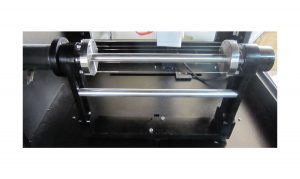Electrospinning non woven filter manufacturing
ELECTROSPINNING UNITS
Large Scale INFL6100B Blown Electrospinning Unit for N95 and F9 filter material
For further details,
Laboratory Equipment Worldwide
For further details,
Electrospinning is an established method of producing nano- and micro-fibres from a wide variety of natural and synthetic polymers is knows as Electrospinning
The method used to produce these fibres is as follows:
By introducing a polymer solution at a constant flow rate though a small restriction such as a syringe needle.
A high voltage, typically 10 to 30 kV is connected to the needle; it is the applied voltage that induces a charge on the surface of the liquid droplet, when a critical charge is reached, the physical shape of the droplet surface changes, the hemispherical surface of the fluid elongates and a Taylor cone forms.
By applying a greater voltage the now charged droplet , the charged liquid jet is ejected from the Taylor cone and attracted to the earthed collector, which is positioned at a fixed distance from the needle. During this process the solvent evaporates from the polymer solution, leaving dry polymer fibres on the collector.
Our lab scale electrospinning machine has the ability to prepare polymeric/ceramic nanofibers with diameter range of 50 nm to a few microns. Electroris® electrospinning setup mainly consists of main body including syringe pump, spinneret, collector system and high voltage power supply. Two different types of Electroris are available:
In side by side Dual pump Electrospinning system, there are two syringe pumps on both sides of the rotating collector drum;
Production rates will be twice that of the standard model,
Main advantage of this model.
With this flexibility in design, our equipment is especially suitable in:
Our device controls the electrospinning parameters including injection rate of polymeric solution, electrospinning distance, rotating speed of collector drum, working temperature (room temperature to 45°C) and working time. Electroris® supplies sufficient safety scheme for users with respect to the handling of a high voltage power supply and chemical solvents.
Electrospinning is An established method of producing nano- and micro-fibres from a wide variety of natural and synthetic polymers is knows as Electrospinning
Electroris® is a lab-scale electrospinning machine to prepare polymeric/carbon/ceramic nanofibers with diameter range of 50 nm to a few microns. The machine mainly consists of metallic body, syringe pump, spinneret system, collector system and high voltage power supply.
In side by side Electrospinning system, there are two syringe pumps on both sides of the rotating collector drum, making the system to consist of 2 syringe pumps, 2 scan systems, 2 distance adjusters and 2 high voltage power supplies.
Even though the production rate of dual pump model is two times higher compared to the standard one, this is not its main advantage.
In these systems two different materials could be electrospun simultaneously. Furthermore, the system makes it possible to electrospin polymeric material from one side and additive materials, such as medications, from the opposite side, producing composite nanofibers containing desired components.
Therefore, it is suitable for pharmaceutical, medicinal, biological, etc. applications.
This machine employs a panel for controlling electrospinning parameters including injection rate of polymeric solution, electrospinning distance, rotating speed of collector drum, working temperature (room temperature to 45°C) and working time. Electroris® provides excellent safety schemes for the users with respect to the handling of high voltage power supply and chemical solvents.
There is also the option of Humidity control.
Rotating collector of electrospinning, used for collecting aligned nanofiber sheet.
This is the simplest & the effective method to make aligned nanofibers.
There are various ways to get your fibres collected depending on the product you wish to collect, from precise nanofiber diameters, meshes and fibre material for masks.


Continuous sheets can be produced for laboratory or we have larger industrial scale versions for the production of face mask materials.
We have the complete range for your laboratory accessories and beyond.
